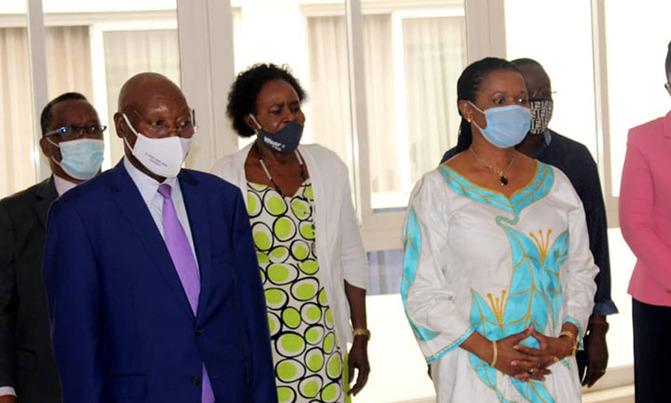Africa-Press – Uganda. COVID-19| FESTIVE SEASON
As we celebrate the festive season, the Nabagereka of Buganda, Sylvia Nagginda, has urged members of the public to continue observing the standard operating procedures in order to prevent the spread of COVID-19.
The Nabagereka noted that the year has been stressful due to the impact of the COVID-19 pandemic, adding that during this period of merry-making, the temptation is high among members of the public to relax their guard, which she has warned against.
“I urge members of the public to listen to the experts and be action-oriented in terms of carrying on what they have learnt. Take care of yourself and remain vigilant in fighting the spread of COVID-19. Do not let your guard down during the festive season,” she said.
For example, the Nabagereka noted that while many people have masks, they just carry them around, but do not use them correctly, which is unfortunate. “Do not just hold on to your masks, use them. Do not get tired of washing your hands and using sanitizers, there is light at the end of the tunnel and we might have access to a vaccine soon.”
In addition to prevention of COVID-19, the Nabagereka has urged members of the public to take responsibility for their health and wellbeing. She has urged them to continue protecting themselves against HIV and other infectious diseases. “The Government and partner organizations can do so much in providing the population with health services. However, ultimately, it is the responsibility of the individual to maintain good health for themselves. Therefore, I urge each individual to take charge of their health.”
She urged members of the public to seek the right information to enable them make the right decisions.
The Nabagereka made the remarks during the annual general meeting of The Programme for Accessible Health Communication and Education (PACE), a local health-promoting NGO, which was held in Kampala recently.
The executive director of PACE, Phellister Nakamya, noted that they aim at improving lives and health through interventions in malaria, HIV/AIDS, prevention of sexually transmitted infections and social behavior change programming to improve the behavior of communities to live healthier and productive lives.
The Nabagereka, who is the patron of PACE, commended the organization for its contribution in filling the gap in health service provision, especially in the areas of fighting malaria and promoting sexual and reproductive health and rights (SRHR).
She noted that such organizations play a crucial role in complementing the Government’s work in health provision. “The Government does a lot in the area of health service provision. However, the demands of our population are enormous. Therefore, it needs partners like PACE, which provide crucial support to Government programmes.”
She added that such partners go down to the grassroots and provide targeted services to key populations, for example adolescent girls, young women, members of the fishing communities and sex workers, who are vulnerable to several illnesses such as HIV.
The Nabagereka commended the many innovations, for example internet-based interventions, that organizations have come up with to continue providing services to members of the public during the COVID-19 crisis. “It is good that such organizations have not gone to a standstill, but have worked around the crisis to continue providing services.”
Role of VHTs in health promotion commended
Presenting about PACE’s contribution in fighting malaria, the communications coordinator, Hilda Namutebi, commended the work done by members of the Village Health Teams (VHTs) in promoting good health among the communities. She noted that VHTs ensure that members of the community get treatment and they give them information to bring about social behavioural change, for example, they promote the use of mosquito nets to prevent malaria.
In addition, VHTs are tasked with the treatment of common illnesses, such as malaria, diarrhoea and pneumonia. They also help in mapping of residents so that services can be extended to them wherever they might be.
Data collected by PACE in 2019 shows that 2,198 village health team members reached 72,034 households with information for behavioural change while monitoring the use of mosquito nets. The households made up 94% of the targeted 76,636 households.






